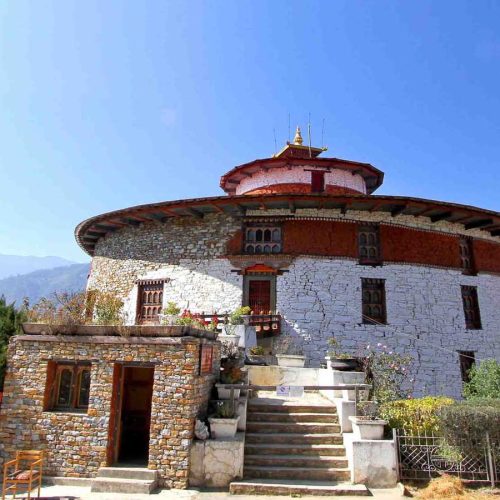Bhutan Cultural Tours
Bhutan Cultural Tours offer a deep dive into the rich cultural heritage of the Kingdom of Bhutan. From exploring ancient monasteries and fortresses to witnessing colorful festivals and experiencing traditional Bhutanese hospitality, these tours provide an immersive experience into Bhutan’s unique way of life.
Key Highlights:
1. Visit Ancient Monasteries and Dzongs:
Monasteries (Gomphas): Bhutan is home to numerous monasteries, each with its own unique history and significance. These monasteries serve as centers of worship and learning for Bhutanese Buddhists. Visitors to Bhutan have the opportunity to explore these sacred sites, often situated in breathtaking natural settings, and learn about the religious practices and rituals observed by monks and nuns.
Dzongs (Fortress-Monasteries): Dzongs are distinctive Bhutanese architectural structures that serve as administrative and religious centers. They are characterized by their massive whitewashed walls, towering fortress towers (Utse), and intricate woodwork. Dzongs are not only places of governance but also venues for religious ceremonies, cultural festivals, and community gatherings. Visitors can admire the craftsmanship of these historic buildings and gain insight into Bhutan’s political and cultural heritage.
2. Attend Colorful Festivals:
Tshechus: Bhutanese festivals, known as tshechus, are celebrated throughout the year across the country. These vibrant festivals commemorate significant events in Buddhist history and feature traditional mask dances, religious rituals, and cultural performances. Tshechus are colorful spectacles that attract locals and tourists alike, providing an opportunity to witness Bhutanese culture and spirituality come to life.
3. Experience Traditional Bhutanese Life:
Cultural Immersion: Bhutan Cultural Tours offer opportunities to immerse oneself in the daily life and traditions of Bhutanese communities. Visitors can engage in cultural activities such as folk dances, traditional music performances, and demonstrations of traditional crafts like weaving, pottery, and painting. Interacting with local artisans and families allows for a deeper understanding of Bhutanese customs, values, and way of life.
4. Explore Natural Beauty:
Scenic Landscapes: Bhutan’s natural landscapes are as diverse as they are stunning. From snow-capped mountains and verdant valleys to pristine rivers and dense forests, Bhutan offers a wealth of natural beauty to explore. Cultural tours often include scenic drives through picturesque landscapes, providing opportunities for photography, leisurely walks, and appreciation of the country’s biodiversity.
5. Learn about Buddhism:
Spiritual Exploration: Buddhism plays a central role in Bhutanese culture and society. Cultural tours typically include visits to sacred sites such as temples, monasteries, and stupas, where travelers can learn about Buddhist philosophy, meditation practices, and religious rituals. Interactions with monks and nuns offer insights into the daily life of Bhutan’s spiritual communities and deepen one’s understanding of Buddhist principles.
6. Sample Bhutanese Cuisine:
Culinary Experiences: Bhutanese cuisine is characterized by its use of locally sourced ingredients, aromatic spices, and distinctive flavors. Cultural tours often include opportunities to sample traditional Bhutanese dishes such as ema datshi (chili and cheese stew), phaksha paa (pork curry), and momos (dumplings). Dining experiences may range from casual meals at local eateries to elaborate feasts featuring traditional Bhutanese fare.
Typical Itinerary:
A typical Bhutan Cultural Tour itinerary may include:
- Day 1-2: Arrival in Paro, visit to Paro Taktsang (Tiger’s Nest) Monastery.
- Day 3-4: Thimphu sightseeing, including visits to Tashichho Dzong, National Memorial Chorten, and Buddha Dordenma Statue.
- Day 5-7: Drive to Punakha, visit Punakha Dzong, explore Wangdue Phodrang, and attend a local festival (if timing aligns).
- Day 8-10: Transfer to Bumthang, explore Jakar Dzong, Jambay Lhakhang, and Kurjey Lhakhang, participate in cultural activities.
- Day 11-13: Return to Paro via Trongsa, visit Trongsa Dzong, experience local life in Paro, and attend a farewell dinner.
- Day 14: Departure from Paro.
Additional Options:
- Homestay Experience: Stay with local families to experience authentic Bhutanese hospitality and daily life.
- Adventure Activities: Incorporate adventure activities like hiking, rafting, or mountain biking into the itinerary for a balanced cultural and adventure experience.
- Textile Tours: Customize the tour to focus on Bhutan’s renowned textile industry, with visits to weaving centers and interactions with local artisans.
Considerations:
- Visa Requirement: Travelers to Bhutan require a visa, which must be arranged through a licensed Bhutanese tour operator.
- Festival Timing: Plan the tour around Bhutan’s festival calendar to witness colorful cultural celebrations.
- Altitude: Some destinations in Bhutan are at high altitudes, so travelers should acclimatize gradually to avoid altitude sickness.
Conclusion:
Bhutan Cultural Tours offer a unique opportunity to immerse yourself in the kingdom’s rich cultural tapestry, providing insights into its spiritual traditions, vibrant festivals, and warm hospitality. Whether exploring ancient monasteries, sampling local cuisine, or interacting with friendly locals, these tours promise unforgettable cultural experiences in the Land of the Thunder Dragon.






